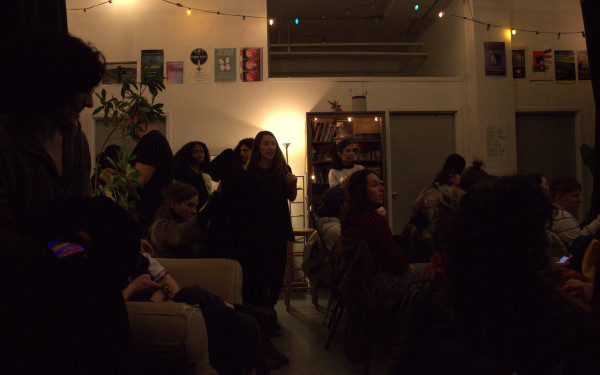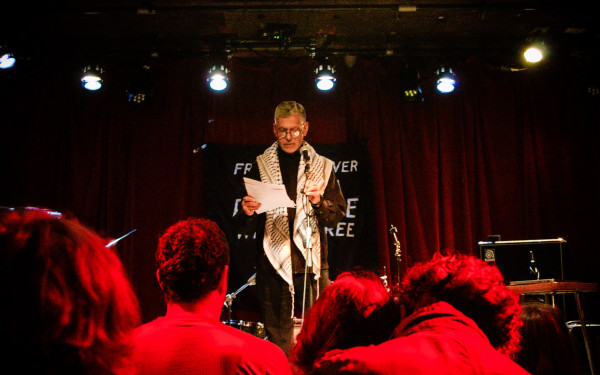Debunking Israelism
Cinema Politica Concordia and IJV’s screening of Israelism examines the cult of Israel in Jewish America
On Monday, Feb. 5, Cinema Politica Concordia (CPC), in collaboration with Independent Jewish Voices Concordia (IJV), presented a screening of indie documentary Israelism. The screening was followed by a Q&A discussion with the film’s producer and supervising editor Brian A. Kates.
Israelism offers a rare and sobering look at the way American Jewish communities have instilled the state of Israel as a fundamental component of being Jewish, and the harm that this conflation brings to both Palestinians and the Jewish diaspora.
On the night of the screening, CPC and IJV members welcomed early attendees at the entrance of room H-110, which was getting increasingly crowded well before the start of the event.
Coordinators collected admission cash donations and hosted a small merchandise table full of books pertaining to Israel and Palestine, while the auditorium promptly filled up with students and activists of all ages. After a brief introductory note from moderator Saskia Recke-Smith, a leader of IJV at Concordia, representatives from the other co-presenters of the event— Paju and Voix Juives— took a few minutes to briefly introduce their respective organizations.
The term “Israelism” is used by the filmmakers to draw a distinction between historical Zionism and the current pro-Israel ideology: a concrete propagandist movement which places Israel and Israeli interests above all else. Israelism mainly follows the perspectives of two Jewish Americans, Simone Zimmerman and Eitan, who describe their gradual disillusionment with the notions that have been indoctrinated in them for most of their lives. The belief that Israel was their “promised land,” and that it was their duty, as Jewish people, to serve in its military, and to defend its reputation from “antisemites” and “self-hating Jews” became deeply entrenched.
After Zimmerman and Eitan started openly speaking out against the erasure and dehumanization of Palestinians, they endured severe backlash and ostracization. Even so, the film argues that there is a general new shift among young Jewish people especially, who seem more willing to have difficult conversations about Israel’s war crimes against Palestine and to reconsider the role it has had in their communities.
Though the documentary went relatively unnoticed during its initial release in early 2023, the escalating atrocities in Palestine post-Oct. 7 have expectedly renewed its place in our current political discourses. Recke-Smith acknowledged that there was some apprehension among IJV members on how the controversial film would be received; in the past months, several screenings had been cancelled or banned in the US and Canada.
Nonetheless, IJV felt it was necessary to showcase an alternative voice to the “one-sided” Jewish perspective that has been grossly overrepresented in current discussions of Israel and Palestine.
“Sometimes non-Jews don’t understand why there is this obsession with Israel from people who have never been there and don’t come from there—looking into what goes into that indoctrination is an important thing to be aware of right now. It made sense that this was one of the first events we put out,” said Recke-Smith. In the discussion segment following the screening, Kates expressed how Israelism should be treated as an educational tool, and that the filmmakers hoped to spark more openness and inclusivity in broader inter-Jewish dialogues.
Audience members commented on how the film could have benefitted from the inclusion of more Palestinian voices. Recke-Smith agreed that while the film’s depiction of the Israel-Palestine conflict is not “radical by any means,” it was conceived as an intertextual film to incite reflection within the Jewish community; particularly in regards to the way Jewish youth are educated about the Holocaust, which too often turns into re-traumatization. “This is at the core of the blind trust and faith in the state of Israel,” Recke-Smith said.
Israelism also convincingly lays out how, in a disturbing recent trend, the American right wing has been insidiously exploiting Jewish devotion to Israel to further their personal agendas. Many Jewish Americans choose to back right-wing politicians that tout unconditional support for Israel, while not realizing that right wing rhetoric has been directly fueling the concerning rise of antisemitism and anti-Jewish hate crimes. Ultimately, equating pro-Israel to pro-Jewish, or anti-Zionism to antisemitism, harms all Jewish people. Israelism advocates earnestly and effectively for a more critical understanding of Zionism within and beyond the diaspora.
Nathan Nguyen, an international development and cultural studies double-major, was surprised and impressed with the film’s case study: “It’s fascinating to see how indoctrination works inside these communities. The two main protagonists are so inspiring, and I don’t think the film would have been so effective if it didn’t include their perspectives.”
IJV and CPC hope that this event will encourage more students to get involved in anti-Zionist, pro-Palestine organizing on campus and in the broader Montreal.
This article originally appeared in Volume 44, Issue 10, published February 13, 2024.

_900_1200_90.jpeg)
_600_832_s.png)




